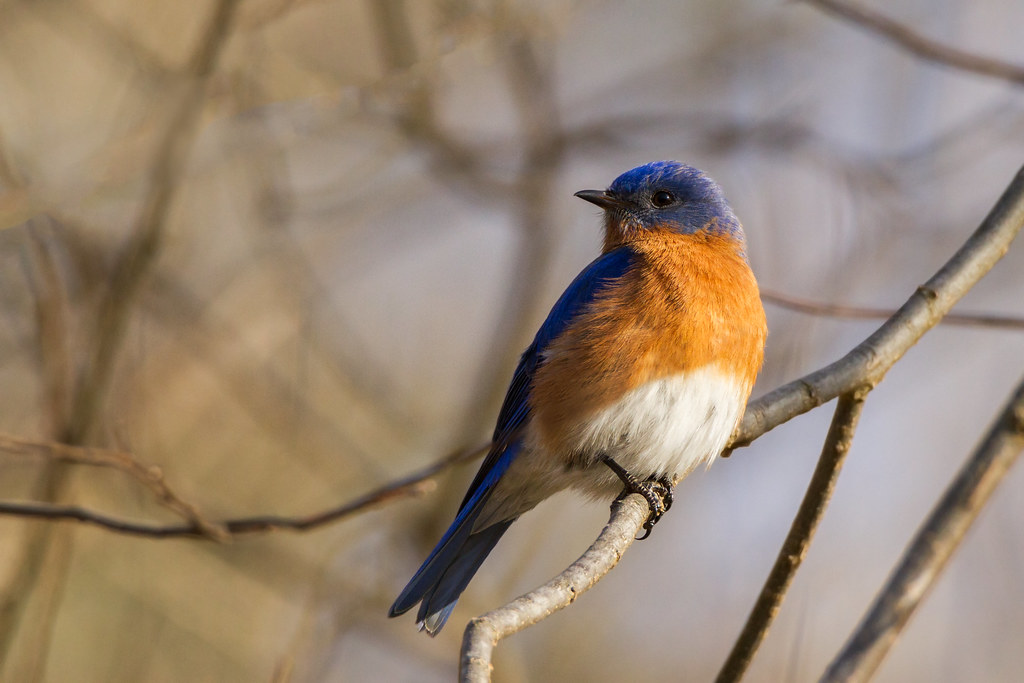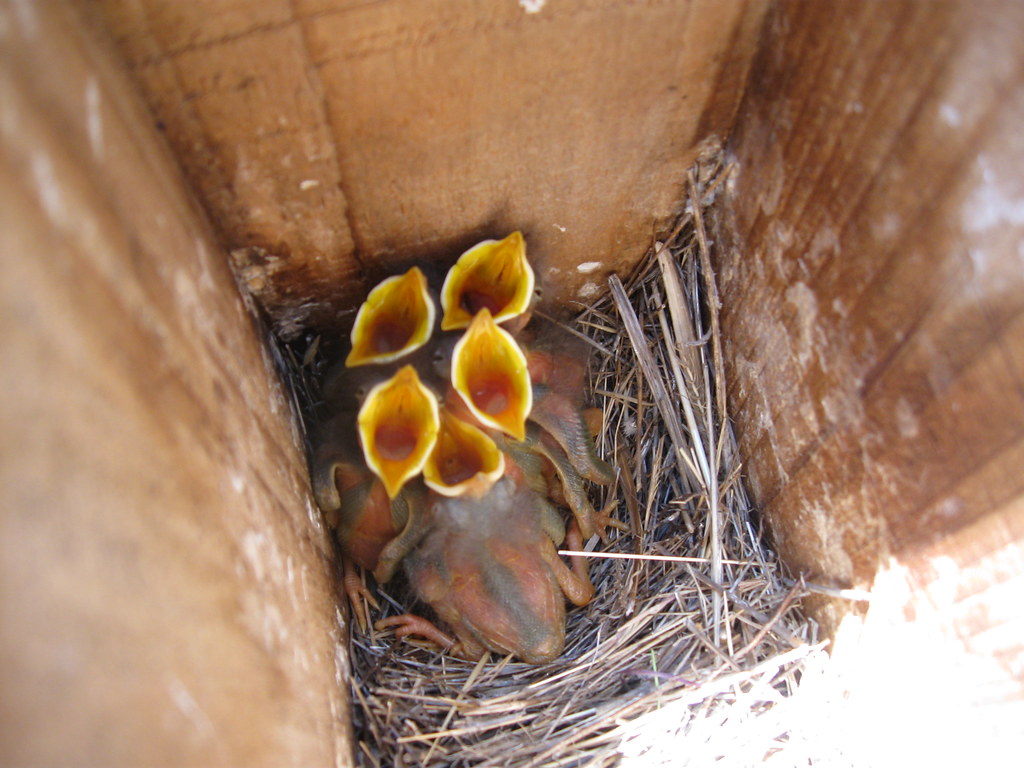
I always grew up believing that you shouldn’t touch baby birds because the smell of humans will make their parents abandon them. Well, if you monitor bluebird nest boxes, like I do, you will know that it is almost impossible to avoid close contact with bluebird nests. Weekly nest box monitoring requires some amount of close contact. You might be wondering how good of a sense of smell bluebirds have and if there’s any truth to the old human-smell myth. Question of the day: can bluebirds smell?
Bluebirds do not have a good sense of smell, so they will not abandon their nests or their nestlings simply because humans have touched them. You should be careful, however, not to handle bluebird nestlings after they are around 2 weeks old, since this may cause them to leave the nest prematurely.
In this article, we will talk about why it’s not a big deal to touch bluebird nests and nestlings (up to a point). We will also cover why you shouldn’t handle baby bluebirds after they are two weeks old, and how to go about handling baby bluebirds in emergency situations.
First, here is what we actually know about a bluebird’s sense of smell.
Can Bluebirds Smell? – What Scientists Have Found
Bluebirds don’t actually have a strong sense of smell, according to a scientist from the Cornell Lab of Ornithology, and many others (source). This is good news for us because it means that bluebirds will not be negatively affected by humans innocently touching their nests or monitoring a nest box.
Even if they can smell us, bluebirds have not been shown to avoid nest boxes or to abandon their young because of the smell of humans. In fact, a 2019 study from the Wilson Journal of Ornithology found that Eastern Bluebirds don’t even avoid nest boxes that smell like their main predators.
When scientists in this particular study added raccoon and mouse urine to bluebird nests, the bluebirds tended not to change nest boxes in response to the smell. They preferred to keep going with the nest that contained the predator’s odor. We can generally conclude from this that bluebirds will not be turned off by the smell of humans, if even predator smells don’t seem to bother them.
Anecdotally, I have monitored almost a hundred bluebird nest boxes over the years and I always come into close contact with the nesting material and baby bluebirds. Many times I even get eye-to-eye with the female bluebird while she is sitting on her eggs. This close contact with humans (smell, sight, etc.) doesn’t seem to scare off bluebirds or cause them much alarm.
Close Contact with Bluebirds is Important for Nest Box Monitoring
As a responsible bluebird landlord (nest box monitor), we recommend monitoring your bluebird nest boxes on a weekly basis during the spring/summer nesting season. This means opening up the nest boxes to see what’s going on inside. This will allow you to throw out any House Sparrow nests that you find, catch any predator activity early, and know when bluebirds or other native birds have finally started building a nest or laying eggs. Monitoring your nest boxes is important.
It’s also fun to see how baby bluebirds develop from day to day as their eyes open and bodies grow.

The Dangers of Close Contact with Growing Baby Bluebirds
While weekly monitoring of your bluebird nest boxes is important, you should stop opening the nest box when baby bluebirds reach 12-14 days old. At around the 2 week mark, bluebird nestlings aren’t quite mature enough to leave the nest yet, but they are physically capable of leaving the nest. At this age, seeing a human open the nest box can startle the baby bluebirds and cause them to fly out of the nest prematurely. So, stop opening up the nest box around two weeks after the eggs have hatched. The baby bluebirds should be leaving the nest soon anyway.
Handling Baby Bluebirds in Emergencies
It is normally not recommended to physically handle bluebird nestlings during routine nest box monitoring; simply opening the nest box to monitor activity is enough. Since bluebirds can’t really smell, passing along your human scent is not an issue, but moving bluebirds around the nest box could injure them, cause distress, or alarm the adult bluebirds who are taking care of them.
You may, however, need to handle baby bluebirds during emergency situations. For example, if you find that one of the newborn bluebird nestlings has somehow fallen on the ground and is still alive, gently place it back into the nest with the other nestlings. The adult bluebirds should be able to successfully handle caring for it from there.
If you find a bluebird nestling or nest and on the ground and you think something might have happened to the parents, call a professional wildlife rehabilitation clinic near you for advice or immediate assistance. You can find a wildlife rehabilitator in your zip code on the Animal Help Now website. Click here to find help in your area.
Conclusion: Can Bluebirds Smell?
In conclusion, bluebirds do not have a very good sense of smell. Because of this, it is generally fine for humans to touch bluebird nests and nestlings without worrying about adult bluebirds abandoning their young. Passing contact with the nest a few times a week is typically not a problem at all. Consider the old “birds smelling humans and abandoning their young” myth busted. However, even though bluebirds can’t really smell, there is something you should keep in mind.
When bluebird nestlings reach the age of about 12-14 days old, humans should avoid contact with nestlings so that the baby bluebirds don’t become frightened and leave the nest prematurely. So, even if you are an active nest box monitor, you should leave the nest box completely alone two weeks after the bluebird eggs have hatched.
This all might sound rather complicated, but it really isn’t. To learn how you can be an effective nest box monitor and attract bluebirds to your own back yard, read our other article called How to Become a Bluebird Landlord. That will tell you everything you need to know.

